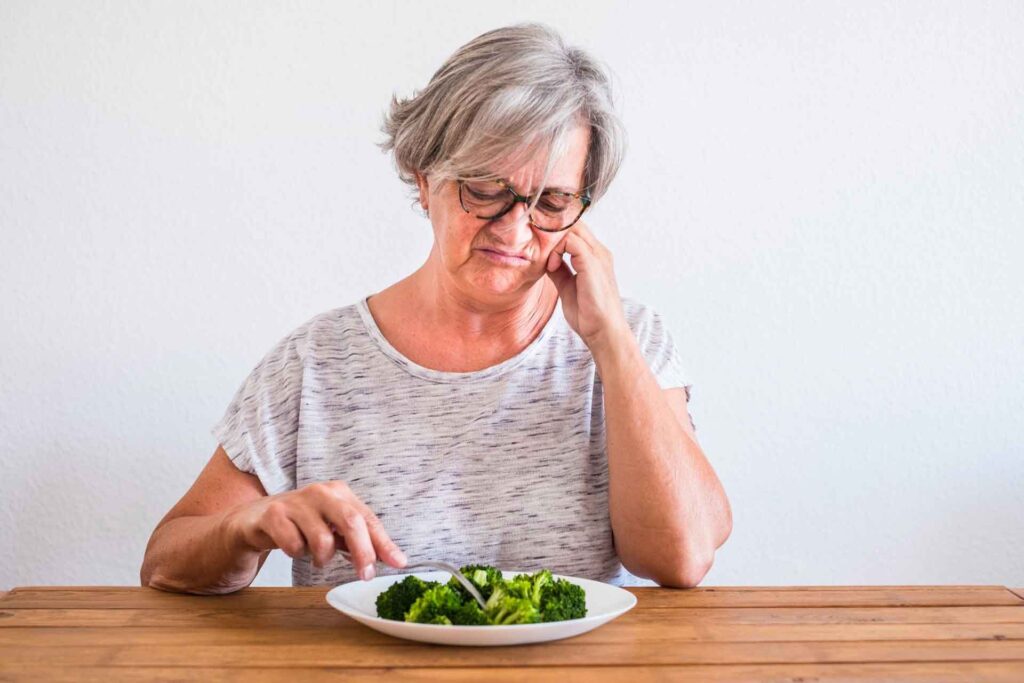If you’ve noticed a change in your elderly loved one’s weight, they may be going through unintentional weight loss. Unintentional weight loss, or a 5 to 10% decrease in body weight over one to 12 months, can occur in seniors often as a natural part of aging, but this doesn’t mean it’s not something you should be concerned about. Often, weight loss can be attributed to difficulties in maintaining a healthy weight, such as inadequate food intake, underlying health issues, or other problems.
While weight loss can sometimes be healthy, if you’ve noticed a rapid change in your loved one’s weight, this is something that should raise a red flag, especially since it can cause health risks. It can lead to a deteriorating immune system, fatigue, overall health decline, and more. You may be wondering what can cause senior weight loss. Here are five reasons behind weight loss and what you can do to help combat the issue:
1. Physical Illnesses
If your loved one is suffering from a chronic physical illness, such as cancer or dementia, these can lead to rapid weight loss in seniors. Cancer accounts for 24 to 38% of unintentional weight loss in seniors. Dementia can also affect weight because it alters seniors’ taste buds, sense of smell, and decreases their appetite. These aren’t the only chronic physical illnesses that can cause weight loss in seniors. Parkinson’s disease, thyroid issues, uncontrolled diabetes, and other illnesses can all have effects on your loved one’s weight.
2. Loneliness and Isolation
If you can’t find a reason for your loved one’s weight loss, loneliness and isolation can often be the reason behind their weight loss. When seniors feel lonely and isolated, their appetite may decrease or their willingness to cook can also decrease, which both lead to weight loss. If your senior loved one is feeling socially isolated, this can lead to depression in addition to weight loss. If your loved one is suffering from loneliness or isolation, spend more time with them and help them to get out of the house more.
3. Physical Eating Challenges
Unintentional weight loss can also be attributed to physical eating challenges that seniors may face. Ill-fitting dentures can cause easting to be a hassle. If your senior is experiencing teeth or jaw pain, it may deter them from eating. Additionally, altered taste buds or nausea when eating can also steer your loved one away from food. There are other physical eating challenges your loved one could be experiencing as well. Try talking with them to see if they experience any discomfort when eating.
4. Medications
Medications that your loved one is prescribed can often have a wide range of side effects, some of which can cause weight loss in seniors. Taking multiple medications has been known to interfere with a senior’s taste and can also affect anorexia. In addition to weight loss, side effects can include dry mouth, nausea, altered taste, and vomiting, which would all cause a senior to want to avoid eating. If your loved one is experiencing medication side effects, talk to their primary physician immediately to find the best course of action.
5. Mental Illnesses
Mental illnesses can also affect your loved one’s weight. One of the most common factors in most mental illnesses, including depression, is weight loss, especially in individuals suffering from bipolar, personality, or anxiety disorders. Not only is weight loss a symptom of mental illness, but it may indicate substance abuse. If you suspect your elderly loved one is suffering from mental illness, be sure to consult a medical professional right away.
Keep Your Loved Ones Staying Healthy
While unintentional weight loss is a common condition among senior citizens, it is associated with declining health and should be taken very seriously. If you can help your loved one with any of the issues above, do so. If not, seek medical attention immediately so that your loved one may be treated accordingly.
You can also help your loved one to maintain their weight by helping them develop and keep a regular exercise routine. You can also make sure they eat breakfast every day and choose foods that are high in protein and fiber. Help them to stay hydrated, keep in contact with family and friends, and regularly plan social activities with them. Other ways to keep your senior loved one healthy are by making sure they have healthy sleeping habits and considering having someone with them to give them constant care. Visiting Angels provides a wide range of senior care services to help you find the best care for your loved one. Contact us for a consultation today.



